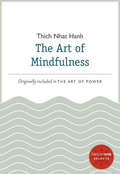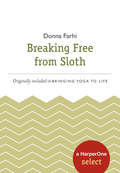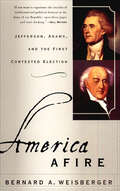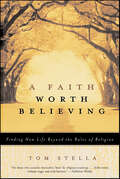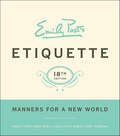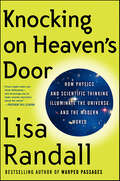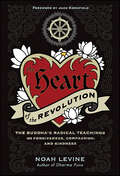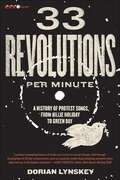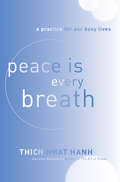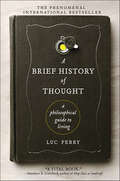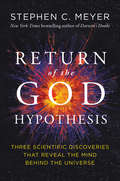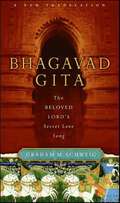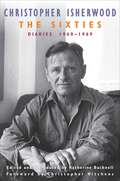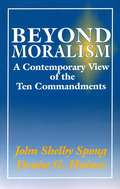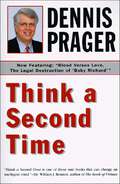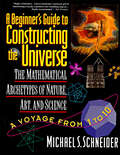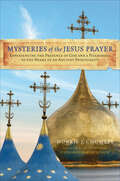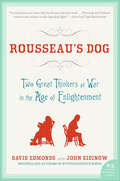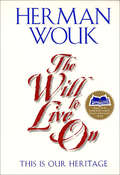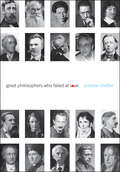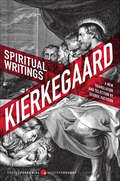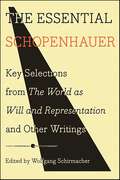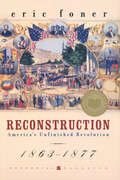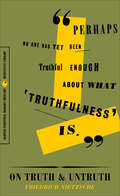- Table View
- List View
The Art of Mindfulness
by Thich Nhat HanhThis selection from Thich Nhat Hanh's bestselling The Art of Power illuminates the core Buddhist concept of mindfulness for the Western reader In The Art of Mindfulness, one of the most revered Buddhist teachers in the world, Thich Nhat Hanh delivers a life changing practice to overcome our overdriven mind, to let go of preoccupations and multitasking and focus solely on the task at hand. By devoting 100% of our attention 100% of the time on what we are doing in the moment, we can alleviate suffering, fear, and anxiety. With the energy of mindfulness and the capacity of looking deeply, we can find the insights to transform and heal any situation.
Breaking Free from Sloth
by Donna FarhiIn this selection from Bringing Yoga to Life, one of America's most respected and loved Yoga teachers helps free us from the trivial humdrum of daily life and shows us how to live more fully by connecting with our soul. In Breaking Free from Sloth, Donna Farhi presents the philosophy of yoga as a path to a deeper awareness of self. Drawing upon her years of teaching with students and writing in an engaging and accessible style, Farhi guides readers through the pitfalls of sloth and reveals the promises of navigating a spiritual practice. "If we define a Yoga practice as an awareness of and investment in our most cherished values, we may be dismayed to discover how little real energy we designate to the central purpose of our life. So when I speak of a habitual disinclination toward effort, I am speaking specifically about purposeful effort. In what ways are we sabotaging ourselves, and how can we extricate ourselves from the mire of self-indulgence?"-from Breaking Free from Sloth
America Afire: Jefferson, Adams, and the First Contested Election
by Bernard A. WeisbergerAmerica Afire is the powerful story of the election of 1800, arguably the most important election in America's history and certainly one of the most hotly disputed. Former allies Adams and Jefferson, president versus vice president, Federalist versus Republican, squared off in a vicious contest that resulted in broken friendships, scandals, riots, slander, and jailings in the fourth presidential election under the Constitution.
A Faith Worth Believing: Finding New Life Beyond the Rules of Religion
by Tom StellaHow can we have an authentic faith when we no longer have well-defined, codified beliefs? Where do we turn to better understand our relationship with God when the messages of the Church seem simplistic? This book is for all those who are asking the tough questions and are not satisfied with the answers they are receiving.
Emily Post's Etiquette: Manners for a New World
by Peggy Post Anna Post Lizzie Post Daniel Post SenningIn this completely updated 18th Edition of the classic Emily Post’s Etiquette, the mantle is picked up by the great-great-grandchildren of the First Lady of Etiquette, who tackle the latest issues and demands of the twenty-first century—from texting and tweeting to iPhones, Facebook, and all forms of social media. Millions of Readers, Eighteen Editions, One Trusted ResourceFrom social networking to social graces, the name Emily Post has been the definitive source on etiquette for generations of Americans. That tradition continues with the 18th edition of Etiquette, which welcomes a new generation of Posts—Anna Post, Lizzie Post, and Daniel Post Senning—the great-great grandchildren of Emily Post. Led by Peggy Post, author of the 16th and 17th editions of Etiquette, this team shows how twenty-first-century manners are a combination of kindness, confidence, and awareness.New trends, topics, and societal hot zones include:When is it okay to “unfriend” someone on Facebook?If I’m in a middle seat on an airplane, do I automatically get both armrests?A business client is sick with a cold—am I obligated to shake his hand?Is it rude for guests to tweet from a wedding?Do I have to buy a gift if I attend a destination wedding?Can I email a condolence note?Should I cover up my tattoo for a job interview?The Posts don’t stint on classic conundrums, either. Emily Post’s Etiquette includes advice on names and titles, dress codes, invitations, table manners, workplace frustrations, and weddings.According to the Posts, though times have changed, the principles of good manners remain constant. Above all, manners are a sensitive awareness of the feelings of others. Being considerate, respectful, and honest is more important than knowing which fork to use. Whether it’s a handshake or a fist bump, it’s the underlying sincerity and good intentions of the action that matter most.
Knocking on Heaven's Door: How Physics and Scientific Thinking Illuminate the Universe and the Modern World
by Lisa Randall“Science has a battle for hearts and minds on its hands….How good it feels to have Lisa Randall’s unusual blend of top flight science, clarity, and charm on our side.”—Richard Dawkins“Dazzling ideas….Read this book today to understand the science of tomorrow.”—Steven PinkerThe bestselling author of Warped Passages, one of Time magazine’s “100 Most Influential People in the World,” and one of Esquire’s “75 Most Influential People of the 21st Century,” Lisa Randall gives us an exhilarating overview of the latest ideas in physics and offers a rousing defense of the role of science in our lives. Featuring fascinating insights into our scientific future born from the author’s provocative conversations with Nate Silver, David Chang, and Scott Derrickson, Knocking on Heaven’s Door is eminently readable, one of the most important popular science books of this or any year. It is a necessary volume for all who admire the work of Stephen Hawking, Michio Kaku, Brian Greene, Simon Singh, and Carl Sagan; for anyone curious about the workings and aims of the Large Hadron Collider, the biggest and most expensive machine ever built by mankind; for those who firmly believe in the importance of science and rational thought; and for anyone interested in how the Universe began…and how it might ultimately end.
The Heart of the Revolution: The Buddha's Radical Teachings on Forgiveness, Compassion, and Kindness
by Noah Levine“The Buddha’s teachings are not a philosophy or a religion; they are a call to action and invitation to revolution.”Noah Levine, author of the national bestseller Dharma Punx and Against the Stream, is the leader of the youth movement for a new American Buddhism. In Heart of the Revolution, he offers a set of reflections, tools, and teachings to help readers unlock their own sense of empathy and compassion. Lama Surya Das, author of Awakening the Buddha Within, declares Levins to be "in the fore among Young Buddhas of America, a rebel with both a good cause and the noble heart and spiritual awareness to prove it,” saying, “I highly recommend this book to those who want to join us on this joyful path of mindfulness and awakening."
33 Revolutions per Minute: A History of Protest Songs, from Billie Holiday to Green Day
by Dorian LynskeyDorian Lynskey is one of the most prominent music critics writing today. With 33 Revolutions Per Minute, he offers an engrossing, insightful, and wonderfully researched history of protest music in the twentieth century and beyond. From Billie Holiday and Woodie Guthrie to Bob Dylan and the Clash to Green Day and Rage Against the Machine, 33 Revolutions Per Minute is a moving and fascinating portrait of a century of popular music that tried to change the world.
Peace Is Every Breath
by Thich Nhat HanhIn his travels around the country and the world, Zen master and international bestselling author Thich Nhat Hanh witnessed a growing unhappiness among the many people he encountered. He saw the hectic pace of our day-to-day lives taking a toll on our health and well-being. In response, the renowned teacher sat down to write Peace Is Every Breath, a book that makes the core teachings of Buddha accessible for everyone. In this jewel of a book, Thich Nhat Hanh does not suggest that we escape from reality and put our busy lives on hold. Far from it. Instead, he provides the insight and tools we need to incorporate the practice of mindfulness into our every waking moment. Thich Nhat Hanh shows us how we can transcend the mad rush of our days and discover within the here and now our own innate ability to experience inner peace and happiness. Offering personal anecdotes, meditations, and advice for mindfully connecting with our present experience, Thich Nhat Hanh guides us around potential pitfalls along the way. We do not need to escape reality to harness the joy and peace that is possible with every breath we take--the power of mindfulness can heal us from the suffering caused by the many stresses that surround us. Including original calligraphy by Thich Nhat Hanh, Peace Is Every Breath is a timely book filled with timeless wisdom and practical advice that is destined to become a classic.
A Brief History of Thought: A Philosophical Guide to Living (Learning to Live)
by Luc FerryNATIONAL BESTSELLER"Ferry's openness, energy, and charm as a teacher burst through on every page." —Wall Street JournalFrom the timeless wisdom of the ancient Greeks to Christianity, the Enlightenment, existentialism, and postmodernism, Luc Ferry’s instant classic brilliantly and accessibly explains the enduring teachings of philosophy—including its profound relevance to modern daily life and its essential role in achieving happiness and living a meaningful life. This lively journey through the great thinkers will enlighten every reader, young and old.
Return of the God Hypothesis: Three Scientific Discoveries That Reveal the Mind Behind the Universe
by Stephen C. MeyerThe New York Times bestselling author of Darwin’s Doubt presents groundbreaking scientific evidence of the existence of God, based on breakthroughs in physics, cosmology, and biology. Beginning in the late 19th century, many intellectuals began to insist that scientific knowledge conflicts with traditional theistic belief—that science and belief in God are “at war.” Philosopher of science Stephen Meyer challenges this view by examining three scientific discoveries with decidedly theistic implications. Building on the case for the intelligent design of life that he developed in Signature in the Cell and Darwin’s Doubt, Meyer demonstrates how discoveries in cosmology and physics coupled with those in biology help to establish the identity of the designing intelligence behind life and the universe. Meyer argues that theism — with its affirmation of a transcendent, intelligent and active creator — best explains the evidence we have concerning biological and cosmological origins. Previously Meyer refrained from attempting to answer questions about “who” might have designed life. Now he provides an evidence-based answer to perhaps the ultimate mystery of the universe. In so doing, he reveals a stunning conclusion: the data support not just the existence of an intelligent designer of some kind—but the existence of a personal God.
Brain Wars: The Scientific Battle Over the Existence of the Mind and the Proof That Will Change the Way We Live Our Lives
by Mario BeauregardThe brain can be weighed, measured, scanned, dissected, and studied. The mind that we conceive to be generated by the brain, however, remains a mystery. It has no mass, no volume, and no shape, and it cannot be measured in space and time. Yet it is as real as neurons, neurotransmitters, and synaptic junctions. It is also very powerful.—from Brain WarsIs the brain "a computer made of meat," and human consciousness a simple product of electrical impulses? The idea that matter is all that exists has dominated science since the late nineteenth century and led to the long-standing scientific and popular understanding of the brain as simply a collection of neurons and neural activity. But for acclaimed neuroscientist Mario Beauregard, Ph.D., along with a rising number of colleagues and others, this materialist-based view clashes with what we feel and experience every day. In Brain Wars, Dr. Beauregard delivers a paradigm-shifting examination of the role of the brain and mind. Filled with engaging, surprising, and cutting-edge scientific accounts, this eye-opening book makes the increasingly indisputable case that our immaterial minds influence what happens in our brains, our bodies, and even beyond our bodies. Examining the hard science behind "unexplained" phenomena such as the placebo effect, self-healing, brain control, meditation, hypnosis, and near-death and mystical experiences, Dr. Beauregard reveals the mind's capabilities and explores new answers to age-old mind-body questions. Radically shifting our comprehension of the role of consciousness in the universe, Brain Wars forces us to consider the immense untapped power of the mind and explore the profound social, moral, and spiritual implications that this new understanding holds for our future.
Bhagavad Gita: The Beloved Lord's Secret Love Song
by Graham M. SchweigThe Bhagavad Gita is often regarded as the Bible of India. With a gripping story and deeply compelling message, it is unquestionably one of the most popular sacred texts of Asia and, along with the Bible and the Qur'an, one of the most important holy scriptures in the world. Part of an ancient Hindu epic poem, the dialogue of the Bhagavad Gita takes place on a battlefield, where a war for the possession of a North Indian kingdom is about to ensue between two noble families related by blood. The epic's hero, young Prince Arjuna, is torn between his duty as a warrior and his revulsion at the thought of his brothers and cousins killing each other over control of the realm. Frozen by this ethical dilemma, he debates the big questions of life and death with the supreme Hindu deity Krishna, cleverly disguised as his charioteer. By the end of the story, Eastern beliefs about mortality and reincarnation, the vision and practice of yoga, the Indian social order and its responsibilities, family loyalty, spiritual knowledge, and the loftiest pursuits of the human heart are explored in depth. Explaining the very purpose of life and existence, this classic has stood the test of twenty-three centuries. It is presented here in a thoroughly accurate, illuminating, and beautiful translation that is sure to become the standard for our day.
The Sixties: Diaries:1960–1969
by Christopher Isherwood“An intimate portrait of the life of a beautiful if neurotic mind… streaked with gossip, flinty observations, great good humor and—despite Isherwood’s fundamental discretion—plenty of frank talk.” — Dwight Garner, New York Times“These diaries are, in their core, a love story…thanks to [them], we bear witness to it all—and are all the richer for it.” — New York Journal of Books“A good writer…intensely self-aware…a fascinating companion…THE SIXTIES [is] accessible to everyone…a true piece of social history.” — Edmund White, New York Times Book Review“The diary entries in The Sixties are a mix of quotidian detail, social observation, moody reverie, gossip and self-rebuke.” — Wall Street Journal“Gossipy, funny, wide-ranging, and revealing…[Isherwood] comes across as approachable, aware, and passionately interested.” — Publishers Weekly
Beyond Moralism
by John Shelby SpongThis thought-provoking guide takes a candid look at the moral issues we face in our daily lives. Using the Ten Commandments as a starting point, the authors bring fresh analysis to such problems as the morality of war in a nuclear age, equitable tax structures, abortion, marital fidelity, capital punishment, care of aging parents, euthanasia, homosexuality, and other contemporary concerns. Beyond Moralism offers solid guidance that is consistent with the Word of God as heard throughout the ages.
Think a Second Time
by Dennis PragerWhat are the two great lies of the 20th century? Is there a solution to evil? What matters more, blood or love? Can a good man go to a striptease show? Do you think you have the answers? ...Think a second time. Dennis Prager, theologian and philosopher turned talk-show host, is one of the most brilliant and compelling voices in America today. His extraordinarily popular radio show with the signature sign-off, "Think a second time," coupled with his own biweekly newsletter, has firmly established him as a fixture in intellectual communities nationwide. In Think a Second Time, Prager blends a rigorous and scholarly education with utterly original thinking on current events. From the dangers of idealism to the roots of extremism to his thoughts on God and an afterlife, Prager offers challenging answers to up-to-the-minute questions: Should a single woman have a child? Why don't good homes always produce good children? Is America really racist? Why does the Holocaust not negate the existence of God? Now, with an entirely new section on the precedent-setting "Baby Richard" custody case and an exploration of the issue of blood versus love, Prager continues to demonstrate his ability to draw clear moral lines in the sands of our very troubled times.
A Beginner's Guide to Constructing the Universe: The Mathematical Archetypes of Nature, Art, and Science
by Michael S. SchneiderDiscover how mathematical sequences abound in our natural world in this definitive exploration of the geography of the cosmosYou need not be a philosopher or a botanist, and certainly not a mathematician, to enjoy the bounty of the world around us. But is there some sort of order, a pattern, to the things that we see in the sky, on the ground, at the beach? In A Beginner's Guide to Constructing the Universe, Michael Schneider, an education writer and computer consultant, combines science, philosophy, art, and common sense to reaffirm what the ancients observed: that a consistent language of geometric design underpins every level of the universe, from atoms to galaxies, cucumbers to cathedrals. Schneider also discusses numerical and geometric symbolism through the ages, and concepts such as periodic renewal and resonance. This book is an education in the world and everything we can't see within it.Contains numerous b&w photos and illustrations.
Mysteries of the Jesus Prayer: Experiencing the Mysteries of God and a Pilgrimage to the Heart of an Ancient Spirituality
by Norris Chumley“Norris Chumley traverses a spiritual landscape unfamiliar to most Westerners. . . . Take this book and read. Even better, read this book and accept its invitation to pray.” —Diana Butler Bass, author of A People's History of Christianity Norris Chumley presents a lavishly illustrated companion to the PBS documentary Mysteries of the Jesus Prayer. Readers can follow Chumley on a pilgrimage through the holiest sites of the early Christian world as he searches for modern-day practitioners of the ancient Eastern mystical tradition and its most sacred prayer: "Lord Jesus Christ, Son of God, have mercy on me, a sinner." This beautifully illustrated volume includes black-and-white and full-color images of the author's travels through Eastern Europe, including rare pictures from visits to holy sites where photographers are only rarely granted access.
Rousseau's Dog: Two Great Thinkers At War in the Age of Enlightenment
by David Edmonds John Eidinow“A detailed and fascinating reexamination of this story by David Edmonds and John Eidinow.” — New York Review of Books“Sprightly and accessible . . . David Edmonds and John Eidinow have heightened intellectual feuds beyond the shallows of anecdote.” — San Francisco Chronicle“As we’ve come to expect from Edmunds and Eidinow, their analysis of the personalities in question is sharp and engaging.” — Los Angeles Times“An enthralling account of a trifling provocation inflated to epic proportions.” — Kirkus Reviews
The Will To Live On: This is Our Heritage
by Herman WoukHerman Wouk has ranged in his novels from the mighty narrative of The Caine Mutiny and the warm, intimate humor of Marjorie Morningstar to the global panorama of The Winds of War and War and Remembrance. All these powers merge in this major new work of nonfiction, The Will to Live On, an illuminating account of the worldwide revolution that has been sweeping over Jewry, set against a swiftly reviewed background of history, tradition, and sacred literature.Forty years ago, in his modern classic This Is My God, Herman Wouk stated the case for his religious beliefs and conduct. His aim in that work and in The Will to Live On has been to break through the crust of prejudice, to reawaken clearheaded thought about the magnificent Jewish patrimony, and to convey a message of hope for Jewish survival.Although the Torah and the Talmud are timeless, the twentieth century has brought earthquake shocks to the Jews: the apocalyptic experience of the Holocaust, the reborn Jewish state, the precarious American diaspora, and deepening religious schisms. After a lifetime of study, Herman Wouk examines the changes affecting the Jewish world, especially the troubled wonder of Israel, and the remarkable, though dwindling, American Jewry. The book is peppered with wonderful stories of the author's encounters with such luminaries as Ben Gurion, Isidor Rabi, Yitzhak Rabin, Saul Bellow, and Richard Feynan.Learned in general culture, warmly tolerant of other beliefs, this noted author expresses his own other beliefs, this noted author expresses his own faith with a passion that gives the book its fire and does so in the clear, engaging style that--as in all Wouk's fiction--makes the reader want to know what the next page will bring.
Great Philosophers Who Failed at Love
by Andrew ShafferFew people have failed at love as spectacularly as the great philosophers. Although we admire their wisdom, history is littered with the romantic failures of the most sensible men and women of every age, including:Friedrich Nietzsche: "Ah, women. They make the highs higher and the lows more frequent." (Rejected by everyone he proposed to, even when he kept asking and asking.)Jean-Paul Sartre: "There are of course ugly women, but I prefer those who are pretty." (Adopted his mistress as his daughter.)Louis Althusser: "The trouble is there are bodies and, worse still, sexual organs." (Accidentally strangled his wife to death.)And dozens of other great thinkers whose words we revere—but whose romantic decisions we should avoid at all costs.Includes an excerpt from Andrew Shaffer's new book Literary Rogues.
Spiritual Writings: A New Translation and Selection (Harper Perennial Modern Thought Ser.)
by Soren Kierkegaard George Pattison“By far the most profound thinker of the 19th century” —Ludwig Wittgenstein “Kierkegaard’s great contribution to Western philosophy was to assert, or to reassert with Romantic urgency, that, subjectively speaking, each existence is the center of the universe.” —John Updike, The New YorkerHarper Perennial Modern Classics presents the rediscovered spiritual writings of Søren Kierkegaard, edited and translated by Oxford theologian George Pattison. Called “the first modernist” by The Guardian and “the father of existentialism” by the New York Times, Kierkegaard left an indelible imprint on existential writers from Sartre and Camus to Kafka and Derrida. In works like Fear and Trembling, Sickness unto Death, and Either/Or, he by famously articulated that all meaning is rooted in subjective experience—but the devotional essays that Patterson reveals in Spiritual Writings will forever change our understanding of the great philosopher, uncovering the spiritual foundations beneath his secularist philosophy.
The Essential Schopenhauer: Key Selections from The World as Will and Representation and Other Writings (Harper Perennial Modern Thought Ser.)
by Arthur Schopenhauer“We should be grateful to Schopenhauer for managing to express the truth about life so beautifully.” —Alain De Botton, author of The Consolations of Philosophy“Schopenhauer’s philosophy has had a special attraction for those who wonder about life’s meaning, along with those engaged in music, literature, and the visual arts.” —Stanford Encyclopedia of Philosophy The Essential Schopenhauer delivers the first comprehensive English anthology of the seminal philosopher’s writings. Edited by Wolfgang Schirmacher, president of the International Schopenhauer Association, this indispensible collection affords readers a uniquely accessible gateway into the monolithic thinker’s prodigious body of work. Just as the Harper Perennial Basic Writings seriesrenders the work of Heidegger and Nietzsche accessible for English readers, The Essential Schopenhauer gives us unprecedented access to the complex ideas of this profound and influential thinker.
Reconstruction: America's Unfinished Revolution, 1863-1877
by Eric FonerThis "masterful treatment of one of the most complex periods of American history" (New Republic) made history when it was originally published in 1988. It redefined how Reconstruction was viewed by historians and people everywhere in its chronicling of how Americans -- black and white -- responded to the unprecedented changes unleashed by the war and the end of slavery. This "smart book of enormous strengths" (Boston Globe) has since gone on to become the classic work on the wrenching post-Civil War period -- an era whose legacy reverberates still today in the United States.
On Truth and Untruth: Selected Writings (Harper Perennial Modern Thought Ser.)
by Friedrich NietzscheNewly translated and edited by Taylor Carman, On Truth and Untruth charts Nietzsche’s evolving thinking on truth, which has exerted a powerful influence over modern and contemporary thought. This original collection features the complete text of the celebrated early essay “On Truth and Lie in a Nonmoral Sense” (“a keystone in Nietzsche’s thought” —Stanford Encyclopedia of Philosophy), as well as selections from the great philosopher’s entire career, including key passages from The Gay Science, Beyond Good and Evil, On the Genealogy of Morals, The Will to Power, Twilight of the Idols, and The Antichrist.
